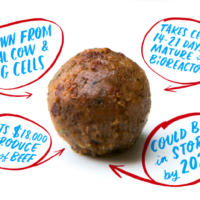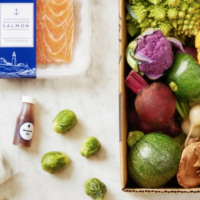
Every week we track the business, tech and investment trends in CPG, retail, restaurants, agriculture, cooking and health, so you don’t have to. Here are some of last week’s top headlines.
News in retail continues to steal headlines in weekly top news. Amazon slashed prices up to 43% at Whole Foods on its official first day as owner of Whole Foods, adding to the competitive pressure of the fast-changing $800 billion supermarket industry. Target finally cut ties with Hampton Creek, explaining that food safety allegations were too much of a risk for the retail giant, despite the FDA’s conclusion that their products were safe. Blue Apron’s Chief Financial Officer Brad Dickerson revealed the struggles behind e-commerce subscription services and a break down of their spendings and losses, which has amounted to $31.6 million.
In restaurant news, Starbuck’s digital ordering system has taken off successfully and managed to change consumer behavior in such a way that should inspire envy in Silicon Valley types. Restaurants turn to data-mining from social media, review sites, and tracking apps to stay competitive.
And finally, a new kind of eating disorder born from wellness culture called orthorexia that obsesses over consuming foods that are “pure” and “clean.”
Check out our weekly round-up of last week’s top food startup, tech and innovation news below or peruse the full newsletter here.
Our newsletter is the absolute easiest way to stay on top of the emerging sector, so sign up for it today and never miss the latest food tech and innovation news and trends, Already signed up? Share the love with your friends and colleagues!
_______________
1. Amazon Cuts Whole Foods Prices as Much as 43% on First Day – Bloomberg
Cutting prices at the chain with an entrenched reputation for high cost is a sign that Amazon is serious about taking on competitors such as Walmart, Kroger and Costco.
2. Inside Amazon + Whole Foods: The First Day – Food Dive
Strategically discounted prices and new signage promoting the grocer’s online shopping platform were on display in Whole Foods.
3. Target Ends Relationship with Troubled Startup Hampton Creek – Bloomberg
The retail giant decided to end the relationship after receiving what it described as “specific and serious food safety allegations about Hampton Creek products,” despite the FDA’s conclusion that their products are safe.
4. Blue Apron’s Struggles Show Why It’s Tough to Make It With E-Commerce Subscriptions – Bloomberg
The business model for subscription boxes turns out to be much tougher than it sounds, because of the high costs of getting and keeping customers. The company spent $94 in the past three years to acquire each subscriber and $144m on marketing in 2016.
5. Starbucks Teaches Silicon Valley a Lesson in Tech – Barron’s
The company’s digital ordering system has become major hit, changing consumer payment behavior in a way that should inspire envy in Silicon Valley.
6. To Survive in Tough Times, Restaurants Turn to Data-Mining – New York Times
Startups and established companies are both scrambling to deliver immediate data on sales, customers, staff performance or competitors by merging restaurant information with data from sources such as social media, review sites, and tracking apps.
7. Is Wellness Culture Creating a New Kind of Eating Disorder? – Quartz
British actress Daniella Isaacs was once entrenched in the world of wellness until realizing that she had orthorexia, an eating disorder about a moral fixation on consuming “pure” and “clean” foods.
8. Arable Capital Partners Closes Debut Fund at $300m – Global AgInvesting
Arable aims to fill the funding gap that exists in the food and agriculture sectors. The funds will be spent on operating businesses in agriculture.
Related Posts
 Blue Apron Hit With Class-Action Lawsuits, Amazon Lowers Whole Foods Prices, Target Splits With Hampton Creek + More
Blue Apron Hit With Class-Action Lawsuits, Amazon Lowers Whole Foods Prices, Target Splits With Hampton Creek + More House Farm Bill Collapses, Blue Apron Goes Brick-and-Mortar, Rebbl Raises $200M + More
House Farm Bill Collapses, Blue Apron Goes Brick-and-Mortar, Rebbl Raises $200M + More Walmart Named Logical Blue Apron Buyer, Humane Society CEO Resigns Amid Sexual Harassment Allegations + More
Walmart Named Logical Blue Apron Buyer, Humane Society CEO Resigns Amid Sexual Harassment Allegations + More


